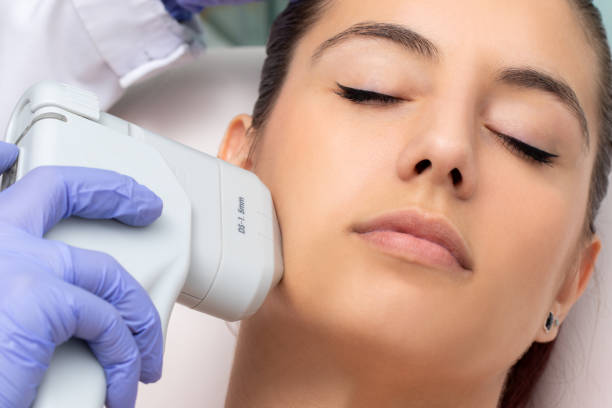Before and After HIFU Face Lifting Treatment: What to Expect?
Seeking younger and radiant skin? High-Intensity Focused Ultrasound (HIFU) emerges as a groundbreaking solution. This non-surgical facelift technology is capturing the attention of those seeking age-defying results without the invasiveness of traditional surgery. In this article, we'll explore what HIFU is, how it works, and what you can expect before, during, and after the treatment.
The Effects of Ageing on Skin
Ageing is an inevitable process that leaves its mark on our skin in various forms. The skin, our largest organ, begins to lose its youthful vigour as the production of collagen and elastin, the structural proteins, diminishes.
This decline starts as early as our mid-20s and becomes more pronounced over time. The skin's support structure weakens, leading to sagging, the formation of wrinkles, and a loss of elasticity. External factors like UV exposure, pollution, and lifestyle choices like smoking and diet can further exacerbate these effects, accelerating the ageing process.
How Does HIFU Work?
HIFU exemplifies the progress in cosmetic technology. It employs focused ultrasound energy to penetrate the skin's deeper layers, targeting the foundational layers where collagen resides. This energy heats the tissue, creating controlled 'injury,' which, paradoxically, stimulates the body's natural healing response. This response triggers the production of new collagen, leading to a gradual tightening and lifting of the skin. The precision of HIFU allows for targeted treatment, ensuring maximum effectiveness while preserving the integrity of the skin's surface.
Benefits of HIFU Facial Treatment
Non-Invasive Nature
HIFU distinguishes itself with its non-surgical approach. Unlike traditional facelifts, it doesn't involve incisions, anaesthesia, or a lengthy recovery period. This aspect makes it particularly appealing for those seeking significant cosmetic improvements without the risks and downtime associated with surgery.
Natural-Looking Results
HIFU excels in delivering results that look and feel natural. Stimulating the body's own collagen production gradually improves skin texture and firmness. This process ensures that the skin doesn't appear overly tightened or unnatural but rather subtly rejuvenated.
Safety Profile
HIFU has an excellent safety record. It's suitable for various skin types and tones, with a lower risk of complications compared to invasive procedures. The precision of ultrasound energy ensures targeted treatment, minimising the impact on surrounding tissues.
Convenience
The treatment sessions are relatively quick, typically lasting between 30 to 45 minutes. This convenience allows patients to easily fit HIFU into their busy schedules, making it an ideal solution for those who cannot afford significant time off for recovery.
Durability of Results
The effects of HIFU are enduring. Patients enjoy the benefits of the treatment for several months, with some reporting improvements lasting up to a year or more. This longevity makes HIFU a cost-effective and time-efficient choice for facial rejuvenation.
HIFU: Before and After Treatment Expectations
Before the HIFU Treatment
Preparation for HIFU begins with a detailed consultation. During this session, your practitioner will assess your skin's condition, discuss your aesthetic goals, and determine the best treatment plan. It's crucial to disclose any skin issues or medical conditions to ensure the treatment's safety and effectiveness.
The Treatment
During the HIFU session, a specialised device is used to deliver focused ultrasound energy to the targeted areas. You may experience sensations of heat or tingling as the energy penetrates the skin layers. The practitioner will adjust the device settings to ensure your comfort while achieving optimal results.
After the Procedure
Post-treatment, you might notice some immediate skin tightening, but the full effects develop over the following 2-3 months as collagen production ramps up. It's common to experience some redness or swelling, but these symptoms are typically mild and short-lived.
How Long Does the Treatment Take?
The duration of a HIFU session varies depending on the area being treated. A full-face treatment usually takes about 45 minutes, while smaller areas like the neck or brow may require around 30 minutes.
Side Effects
Mild redness or swelling in the treated area
Sensations of tingling or tenderness
Temporary numbness, especially around sensitive areas
Slight bruising or sensitivity to touch
Rarely, minor skin irritation or temporary changes in skin pigmentation
So, What Are You Waiting For?
At Clarion Aesthetics, we are ready to guide you through the transformative experience of HIFU. Our expert team, equipped with the latest technology, is committed to providing personalised care tailored to your unique needs. Embrace the opportunity to rejuvenate your appearance with no downtime and long-lasting results. Contact us today to begin your journey towards a more youthful, radiant you!
FAQs
What Is the Recovery Time for HIFU Facelift?
One of HIFU's greatest advantages is its no downtime, allowing patients to return to their daily activities immediately after the procedure.
How Long Is Face Swollen After HIFU?
Any swelling typically subsides within a few days post-treatment.
Can I Use Vitamin C Serum After HIFU?
Following your HIFU procedure, it's advisable to steer clear of skincare products containing active elements like retinol and Vitamin C. Your skin tends to be more delicate post-treatment, so emphasising calming and hydrating practices is beneficial.
Can I Wear Makeup After HIFU?
It's advisable to wait at least 12 hours post-treatment before applying makeup to allow the skin to settle.
Is One Session of HIFU Enough?
While some individuals may achieve their desired results after a single session, others might require additional treatments for optimal results, depending on their skin condition and ageing process.


